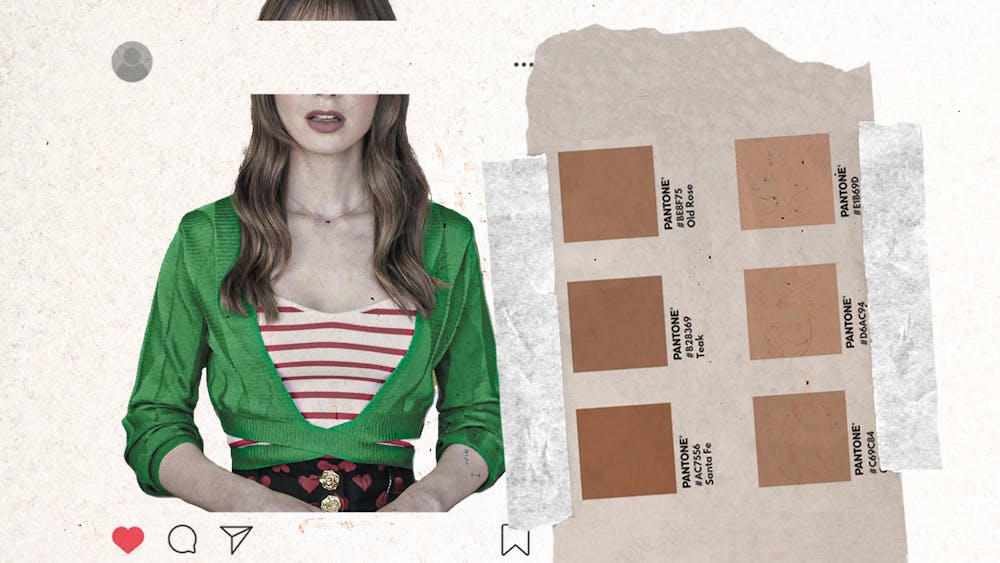Maybe it’s the highly dramatic acting that feels almost mimed at times, or maybe it’s the flamboyant clothing sported by Lily Collins’ character, but whatever it is, the fact remains that Emily in Paris is a show that, while highly entertaining, is usually laughable. Ask someone if they’ve watched the Netflix original series, and they’ll almost certainly roll their eyes and laugh, indicating their dislike for the cheesy program.
The show centers around a marketing executive named Emily Cooper who relocates from Chicago to her firm’s Paris branch after her boss’ pregnancy prevents her from making the move herself. Emily leaves her life behind in America, and with little to no knowledge of the French language or culture, dives into it head first. She is determined to prove herself as a valuable asset to her firm, Savoir.
As she tries to navigate her new life in Paris, she falls in love with her neighbor, befriends her neighbor's girlfriend, becomes best friends with a woman she meets in a Parisian park, moves in with said new best friend, and somehow manages to excel at her job by impressing all of the firm’s clients with creative and successful social media marketing campaigns. Because that apparently wasn’t enough for her, she also decides to start an Instagram account out of nowhere, names the account “@emilyinparis,” and gains an excessive number of followers and insane recognition for simply posting pictures of her daily life.
Yeah, it’s a lot.
That being said, the drama is addictive and the European backdrop is a dream. Looking beyond its highly dramatic nature, the basic premise that Emily, a young white woman, would go viral on social media for merely posting about her life, amass a huge following, and subsequently receive many opportunities and connections isn’t so absurd in today’s media climate.
Just think about Alix Earle, the 22–year–old New Jersey native who blew up overnight on TikTok and now gets to meet Selena Gomez and hang out with Dixie D’amelio at Miley Cyrus’s New Year’s Eve party. She’s currently on an all–expenses–paid influencer brand trip in Dubai with the beauty brand called Tarte Cosmetics. Alix didn’t go viral for doing anything extraordinary—all she did was sit in front of her cell phone camera in her room at the University of Miami and record herself doing her makeup while talking about her life. Today, people who show their personalities, appear honest and/or vulnerable, and have a consistent “brand” can go viral for doing pretty much anything.
In the show, Emily has a bubbly, outgoing personality, and her passion for adventure shines through in her posts. The thing is, though, that this newly mediated phenomenon of “going viral” most definitely privileges a certain type of person: young, attractive, white individuals to be precise. Given this, is Emily’s personality really the reason she went viral? Or is it because she fits the aforementioned mold?
While French people have criticized the show for being offensive in terms of its stereotypical, somewhat rude, and Americanized view of French culture, it actually does hit on a relevant point when it comes to thinking about today’s media environment. If Emily’s character wasn’t a young white woman, would she have gone viral? The plot line also contributes to some people’s guilty pleasure of watching the show, as it somehow fulfills that common pipe dream of being that “one in a million” person to actually go viral.
Even if Emily in Paris doesn’t do the best job of portraying French culture according to the French themselves, it does highlight the fact that this new media environment we live in—where random people (most of the time privileged individuals in society) can become famous overnight on the internet—has become universal. Across borders, it seems like becoming the next Charli D’amelio might not be so far–fetched for some people.
Yes, the show isn’t the most sophisticated in many ways, but it underscores an important and increasingly common phenomenon in global social media culture. Emily in Paris has the potential to make people more conscious of the types of individuals we choose to propel to stardom, why that is, and what implications it has for the world as a whole.







